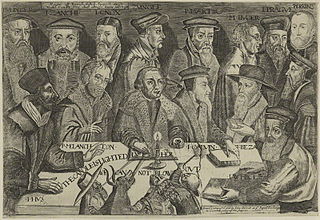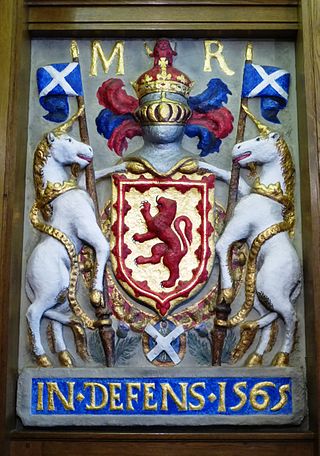
Alexander Henderson was a Scottish theologian, and an important ecclesiastical statesman of his period. He is considered the second founder of the Reformed Church in Scotland. He was one of the most eminent ministers of the Church of Scotland in the most important period of her history, namely, previous to the middle of the seventeenth century.

John Spottiswoode was an Archbishop of St Andrews, Primate of All Scotland, Lord Chancellor, and historian of Scotland.

Sir George Hay, 1st Earl of Kinnoull, was 6thLord Kinfauns from 1621 to 1627, then 1stViscount of Dupplin from 1627 before advancing to the earldom in 1633. He was a Scottish nobleman and political official.

Robert Boyd of Trochrig (1578–1627) was a Scottish theological writer, teacher and poet. He studied at the University of Edinburgh and after attending lectures by Robert Rollock, prosecuted his studies in France, and became a minister in the French Church. All accounts represent him as a most accomplished scholar. A friend said of him, with perhaps some exaggeration, that he was more eloquent in French than in his native tongue; and Livingstone tells us that he spoke Latin with perfect fluency, but that he had heard him say, if he had his choice, he would rather express himself in Greek than in any other language. The Church of Boyd's adoption, which had given Andrew Melville a chair in one university, and Sharp a chair in another, was not slow to do honour to their brilliant countryman. He was made a professor in the protestant Academy of Saumur; and there for some years he taught theology. He was persuaded, however, in 1614 to come home and accept the Principalship of the Glasgow University. Though he was far from extreme in his Presbyterianism, he was found to be less tractable than the king and his advisers expected, and was obliged to resign his office. But he was long enough in Glasgow to leave the impress of himself on some of the young men destined to distinction in the Church in after years.
The Scottish Reformation Parliament was the assembly elected in 1560 that passed legislation leading to the establishment of the Church of Scotland. These included the Confession of Faith Ratification Act 1560; and Papal Jurisdiction Act 1560. The legislation was not formally approved until 1567, when it was ratified by James VI.

Reformed Christianity originated with the Reformation in Switzerland when Huldrych Zwingli began preaching what would become the first form of the Reformed doctrine in Zürich in 1519.

James VI and I, King of Scotland, King of England and King of Ireland, faced many complicated religious challenges during his reigns in Scotland and England.
The history of the Scottish Episcopal Church is traced by the church to ancient times. The Church today is a Christian denomination in Scotland and a member of the Anglican Communion. It has enjoyed a distinct identity and is neither Roman nor English. It is therefore not a Daughter Church in the Anglican communion.
Patrick Galloway was a Scottish minister, a Moderator of the General Assembly of the Church of Scotland. He was Moderator of the General Assembly in 1590, and again in 1602. Having been completely gained over by the Court party he used all his influence in forwarding the views of the King for the introduction of Episcopacy.
John Fergushill (1592–1644), was a 17th-century Minister of the Church of Scotland who supported the 1638 National Covenant and was an associate of Presbyterian fundamentalists, including Archibald Johnson. He died on 11 June 1644.

Prior to the Reformation of 1560, Christmas in Scotland, then called "Yule" or in Gaelic-speaking areas "Nollaig", was celebrated in a similar fashion to the rest of Catholic Europe. Calderwood recorded that in 1545, a few months before his murder, Cardinal Beaton had "passed over the Christmasse dayes with games and feasting". However, the Reformation transformed attitudes to traditional Christian feasting days, including Christmas, and led in practice to the abolition of festival days and other church holidays, the Kirk and the state being closely linked in Scotland during the Late Middle Ages and the Early Modern period. A 1640 act of the Parliament of Scotland abolished the "Yule vacation and all observation thereof in time coming".

Government in early modern Scotland included all forms of administration, from the crown, through national institutions, to systems of local government and the law, between the early sixteenth century and the mid-eighteenth century. It roughly corresponds to the early modern era in Europe, beginning with the Renaissance and Reformation and ending with the last Jacobite risings and the beginnings of the Industrial Revolution. Monarchs of this period were the Stuarts: James IV, James V, Mary Queen of Scots, James VI, Charles I, Charles II, James VII, William III and Mary II, Anne, and the Hanoverians: George I and George II.
Perth Assembly was a controversial book published by the Pilgrims in Leiden in 1619.
David Black was educated at the University of St Andrews. He was admitted to the ministry of the church as minister of St Andrews in November 1590. Having offended James VI by "certain unreverent, reproachfull and infamous speeches in his sermons", he was summoned before the Privy Council on 18 November 1596, but declined its jurisdiction "in matters spiritual". In this he was supported by "his whole brethren of the ministrie". Twelve days later he lodged a second declinature, but was found guilty on 2 December, and "the penaltie referred to the King's will and pleasure". On 9 December he was ordered to enter his person in ward. The Synod of Fife petitioned the King to restore Black to his charge, but that was not done, and he was translated, and admitted to Arbirlot in 1597. He was presented to the vicarage by James VI on 15 May 1598. "While on his way to Perth he died suddenly at Dundee, of apoplexy, immediately after having given thanks at a meal, Tuesday 12 January 1603. He had preached and dispensed the Communion on the preceding Sunday.
William Row (1563–1634) was a Scottish presbyterian divine.
Andrew Duncan was a Latin scholar and Church of Scotland minister at Crail. He achieved notoriety for his presbyterian principles which brought him into conflict with James VI who wished to impose an episcopalian system. He attended the General Assembly of Aberdeen in 1605 which had been proscribed or prorogued by royal authority and was one of six ministers who were imprisoned and later exiled as a result. He was allowed to return after several years in France but was subsequently banished again following further controversy in failing to comply with the Five Articles of Perth. He died in exile in Berwick-upon-Tweed in 1626.
John Sharp was a theologian and Church of Scotland minister. He achieved notoriety for his presbyterian principles which brought him into conflict with James VI who wished to impose an episcopalian system. Sharp graduated with an M.A. from St Andrews in 1592. He was admitted to Kilmany in 1601. He was one of those who, in opposition to the Royal command, attended the General Assembly of Aberdeen. For this he and five other ministers were committed to the Castle of Blackness on 2 August. He was brought before the Privy Council at Perth on 27 August and interrogated as to the constitution of the Assembly. Not giving satisfactory answers they were tried before the Justiciary Court at Linlithgow on 10 January 1606, on a charge of treason, found guilty, and banished for life. On 23 October Sharp went to Bordeaux and became Professor of Theology in the University of Die, but would probably have returned to Scotland had honourable terms of reconciliation been offered him. In 1630 he was compelled to leave France at the instance of Cardinal Richelieu, the Prime Minister, who had grown jealous of Sharp's reputation as a Protestant teacher. Sharp was appointed Professor of Divinity in the University of Edinburgh on 17 November 1630. He died about 1647, aged 75.
John Scrimgeour, was a Presbyterian minister at Kinghorn in Fife. He went as a minister with King James to Denmark, when the monarch went there to fetch home Anne, his young bride to be. He is best remembered for his opposition to the Five Articles of Perth. He would not for example observe holy days other than the sabbath and would not have his congregation take the knee for communion; this led to his being deposed from the ministry of the church. He is also remembered having a verbal exchange with John Spottiswoode in which the archbishop is recorded as saying about King James "I tell you, Mr Johne, the king is Pope now, and so sail be." to which Scrimgeour is said to have replied: "It is an evill [title ?] ye give him." Scrimgeour was banned from taking church services, put out of his parish and put under house arrest but nevertheless he did occasionally help officiate at communion services.

James Lawson was the Church of Scotland minister who succeeded John Knox at St Giles' Cathedral in Edinburgh. Lawson's great educational achievement was the founding of the University of Edinburgh. He may be said to have been its principal promoter, and its best and wisest friend during the first year of its history, 1583.
Archibald Simpson, born in 1564, was a Christian minister, author and poet in Scotland.










